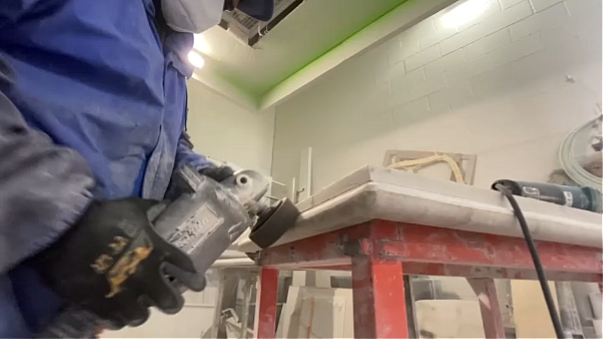That beautiful finish on your kitchen countertop could permanently harm the health of Latino immigrants

Photo courtesy Telemundo 52 Los Angeles
Fancy countertops in our kitchens and restrooms might be causing Latino immigrant workers in California to develop silicosis, an incurable lung disease that can be fatal.
These countertops are made of engineered stone, which is created by binding crushed stones together to form a solid surface. When workers cut and polish these countertops without appropriate protective gear, they inhale crystalline silica particles, which can damage their lungs and lead to a diagnosis of silicosis.
In my reporting for the 2024 California Health Equity Fellowship, I’ll aim to understand why this disease is incurable and whether a lung transplant might be the only solution. Additionally, I'll investigate the wait time for individuals awaiting such transplants.
A revealing study by UCLA and UCSF in July 2023 highlighted this as an emerging health concern. Most affected workers are unaware of the disease and fail to use proper protective gear. The study found that the median age for diagnosis was 45, with nearly all cases affecting Latino immigrant men. Shockingly, more than half were diagnosed late, and 19% of those diagnosed died. Even after diagnosis, about half of the workers continued working in stone fabrication.
Experts note that the disease is now affecting younger men, unlike in the past when it predominantly impacted older individuals. For instance, a 27-year-old man from Pacoima, in the San Fernando Valley, now relies on an oxygen tank due to silicosis. His case represents just one instance of the devastating impact of this disease.
I am particularly interested in exploring the extent of the issue and hearing from families who have lost loved ones to silicosis.
Despite being covered in English-language media, this issue has received little attention in Spanish-language outlets. This lack of awareness could lead to more victims, especially among Latino immigrant men who may not speak English and are unaware of the risks. There is an urgent need for a comprehensive awareness campaign in these communities.
Local nonprofits such as “Pacoima Beautiful” and “Promesa Boyle Heights” are dedicated to ensuring community well-being. I intend to collaborate with these organizations to analyze data and develop effective awareness campaigns.
As this is an emerging health concern, it’s crucial to assess whether authorities are taking steps to mitigate the issue. Are they informing workers and ensuring workplaces adhere to safety regulations? These are questions I aim to address in my forthcoming reporting.

